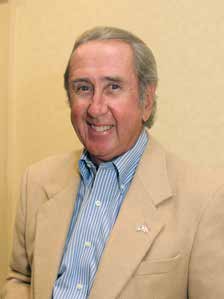Howard Simon faces Challenges Naturally

Jeff Lytle
As the leader of the Florida chapter of the American Civil Liberties Union for nearly 30 years, he was the point man on issues such as same-sex marriage, gay adoption, private school vouchers, the right to die, and voting eligibility and counting.
His choice for a retirement home, amid the treetops of Sanibel Island, represents a sea change from the pulse of downtown Miami. The political setting is different too. But Simon says conservative stalwarts on Sanibel and the rest of Southwest Florida care far less about his past liberal crusades than his mission du jour – clean water.
With Sanibel at the crossroads of dayglow blue-green algae blooms trickling to the Gulf from the Caloosahatchee River, fed by Lake Okeechobee, plus massive red tide outbreaks reaching Naples, all that his new neighbors care about are results after years of talk or even indifference.
Simon’s now aims is to leverage his gravitas with turning policy minutia into public initiatives for a cause attracting attention from entities ranging from the Governor’s Mansion, Florida Gulf Coast University, the Centers for Disease Control, myriad counties and cities, tax watchdogs and community foundations. What is needed among the diverse voices, he says, is a focus on new laws for statewide action — not piecemeal local measures here and there – on septic tanks, stormwater runoff, fertilizers, raking muck from lakes and rivers, and more.
 His Clean Okeechobee Waters project aims to solve problems pro-actively, at the source, rather than pay much more later on repairs. Another emphasis is pitching the clean water cause as a clear and present public health issue, as opposed to a tourism, real estate or fishing/ recreation issue. “People in Florida are slowly being poisoned,’’ he says. Simon comes armed with research completed or in progress in Miami and Wyoming linking toxins from blue-green algae with liver diseases and dementia such as Alzheimer’s and Parkinson’s. Simon is ready with a response for anyone who says his mission is already being addressed: The danger is so great that the time for talk is past.
His Clean Okeechobee Waters project aims to solve problems pro-actively, at the source, rather than pay much more later on repairs. Another emphasis is pitching the clean water cause as a clear and present public health issue, as opposed to a tourism, real estate or fishing/ recreation issue. “People in Florida are slowly being poisoned,’’ he says. Simon comes armed with research completed or in progress in Miami and Wyoming linking toxins from blue-green algae with liver diseases and dementia such as Alzheimer’s and Parkinson’s. Simon is ready with a response for anyone who says his mission is already being addressed: The danger is so great that the time for talk is past.
A key watchdog ally of Simon, the Southwest Florida or Calusa chapter of the international Waterkeeper network, is connecting local government, businesses and arts groups to educate and
compel action. Simon already is a member of its board, which has been working, largely under the radar, since 1995. The group is raising its profile to sue over Lake O discharges and sponsor premiers of two algae-related documentaries, including one narrated by Harrison Ford. The Collier Waterkeeper is much newer and smaller, lately joined by ex-Naples City Council member Linda Penniman.
The Science Simon’s initiative is driven by research led by Paul Cox, a Harvard-educated biologist based in Jackson Hole, Wyoming. His team at Brain Chemistry Labs and other scientists around the world, including Walter Bradley, chair emeritus of the University of Miami’s neurology department, and UM marine biology and ecology professor Larry Brand, are testing and challenging Cox’s discovery made in Guam. He noticed widespread seniors’ neurological ailments, tracking them to a common tree providing food for people and animals considered a local delicacy.
He went on to notice the same toxin is produced in blue-green algae; however, a naturally occurring amino acid, L-serine, readily and cheaply available to the public, could at least slow the diseases’
progress. Cox’s work is the cover story in the February edition of a magazine normally connected to big business – Fortune. The article notes how many billions of dollars have been wasted by Big Pharma.
At least one local politician is not impressed. Florida Senator Kathleen Passidomo, a Naples Republican, prefers the homegrown water research at FGCU working with Mote Marine Laboratory, led by field scientists rather than a social scientist such as Simon.
Work in Progress. In June, when interviews for this article were conducted, Simon was in the process of mapping a course that he said could take 10 years to complete.
Leaders of groups such as The Conservancy lacked enough background for comment. His organization, Clean Okeechobee Waters, did not even have a website.
Initial goals included:
• A massive public education campaign about health hazards from touching, eating fish or even breathing airborne toxins from polluted waters.
• Controlling the spread and operating efficiency of septic tanks, which can leech algae-generating nutrients into water. Simon points to the irony of waterfront residents on septic tanks fueling their own illnesses. The numbers are impressive, with Florida newspapers reporting 2.6 million tanks statewide
and more than 125,000 in Collier and Lee counties. Simon says a return to tank inspections, at least every five years –resisted by state lawmakers — is a must.
• Connecting septic tank households to nearby sewer systems. Simon is proposing joint federal, state and local funding, with multi-year, no-interest financing. And new developments would be required to install sewage systems from the start.
The Connection
Cox’s work is championed by Doug Kinney, a serial entrepreneur usually focused on alternative energy. He serves as fundraising chair for Cox’s lab’s $3 million budget. He lives outside Chicago and North Palm Beach, giving blue-green algae a local hook for him. He served on the Florida ACLU board that worked with Simon. When Simon retired, Kinney saw an ideal match –and ponies up $100,000 a year to have Simon convert science to public policy.
The executive director of Calusa Waterkeeper, KC (cq) Schulberg, is enthused. “Howard’s ability to navigate this landscape and press forward with policy will prove invaluable to our team,” Schulberg says. “…Governor DeSantis and certain elected officials have weighed in with forceful policy and considerable budgets to address these grave ills. And we have an ever-growing army of terrifically dedicated individuals, such as Howard, rising to the challenge.’’
Lytle is the retired editorial page editor and TV host at the Naples Daily News.
Jeff can be reached by email at Jlytle@comcast.net



I understand why septic tanks are of great concern in relation to pollution of waterways, aquifers and drinking H2O…
I would argue fertilizing lawns especially waterfront property Increase toxicity levels to same waterways. How is this issue being addressed?